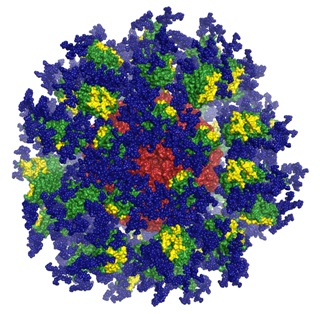Jun 22 2015
New research led by scientists at The Scripps Research Institute (TSRI), International AIDS Vaccine Initiative (IAVI) and The Rockefeller University shows in mice that an experimental vaccine candidate designed at TSRI can stimulate the immune system activity necessary to stop HIV infection. The findings could provide key information for the development of an effective AIDS vaccine.
 TSRI and IAVI scientists have designed a protein nanoparticle called "eOD-GT8 60mer" (above) that binds and activates B cells needed to fight HIV.
TSRI and IAVI scientists have designed a protein nanoparticle called "eOD-GT8 60mer" (above) that binds and activates B cells needed to fight HIV.
The research, published June 18, 2015 in concurrent studies in the journals Cell and Science, represents a leap forward in the effort to develop a vaccine against HIV, which has so far struggled to elicit antibodies (immune system molecules) that can effectively fight off different strains of the virus.
"The results are pretty spectacular," said Dennis Burton, chair of the TSRI Department of Immunology and Microbial Science and scientific director of two centers at TSRI, the IAVI Neutralizing Antibody Consortium (NAC) and the National Institutes of Health (NIH) Center for HIV/AIDS Vaccine Immunology and Immunogen Discovery (CHAVI-ID).
The Science study was co-led by Burton, TSRI Professor and IAVI NAC Associate Director of Vaccine Design William Schief, and TSRI Professor David Nemazee. The Cell study was co-led by Schief and Michel Nussenzweig, who is Zanvil A. Cohn and Ralph M. Steinman Professor at The Rockefeller University and a Howard Hughes Medical Institute (HHMI) investigator.
A Huge Challenge
The researchers' long-term goal is to design a vaccine that prompts the body to produce antibodies that bind to HIV and prevent infection.
While many vaccines for other diseases use a dead or inactive version of the disease-causing microbe itself to trigger antibody production, immunizations with "native" HIV proteins are ineffective in triggering an effective immune response, due to HIV's ability to evade detection from the immune system and mutate rapidly into new strains.
This challenge has led many researchers to believe that a successful AIDS vaccine will need to consist of a series of related, but slightly different proteins (immunogens) to train the body to produce broadly neutralizing antibodies against HIV—a twist on the traditional "booster" shot, where a person is exposed to the same immunogen multiple times.
In the new studies, the scientists tested one of these potential proteins, an immunogen called eOD-GT8 60mer, a protein nanoparticle designed to bind and activate B cells needed to fight HIV. The eOD-GT8 60mer was developed in the Schief lab and tested in mouse models engineered by the Nemazee lab to produce antibodies that resemble human antibodies.
Using a technique called B cell sorting, the researchers showed that immunization with eOD-GT8 60mer produced antibody "precursors"—with some of the traits necessary to recognize and block HIV infection. This suggested that eOD-GT8 60mer could be a good candidate to serve as the first in a series of immunizations against HIV.
"The vaccine appears to work well in our mouse model to 'prime' the antibody response," added Nemazee.
In the Cell paper, researchers used the same eOD-GT8 60mer immunogen but used a slightly different mouse model. "The immunogen again launched the immune system in the right direction," said Schief.
A concurrent study also in Science (led by Professor John Moore of Weill Cornell Medical College and including contributions from Schief, Burton, TSRI Associate Professor Andrew Ward, Ian Wilson, who is Hansen Professor of Structural Biology and chair of the Department of Integrative Structural and Computational Biology at TSRI, and other researchers) showed engineered immunogens also triggered immune responses in rabbit models and non-human primate models.